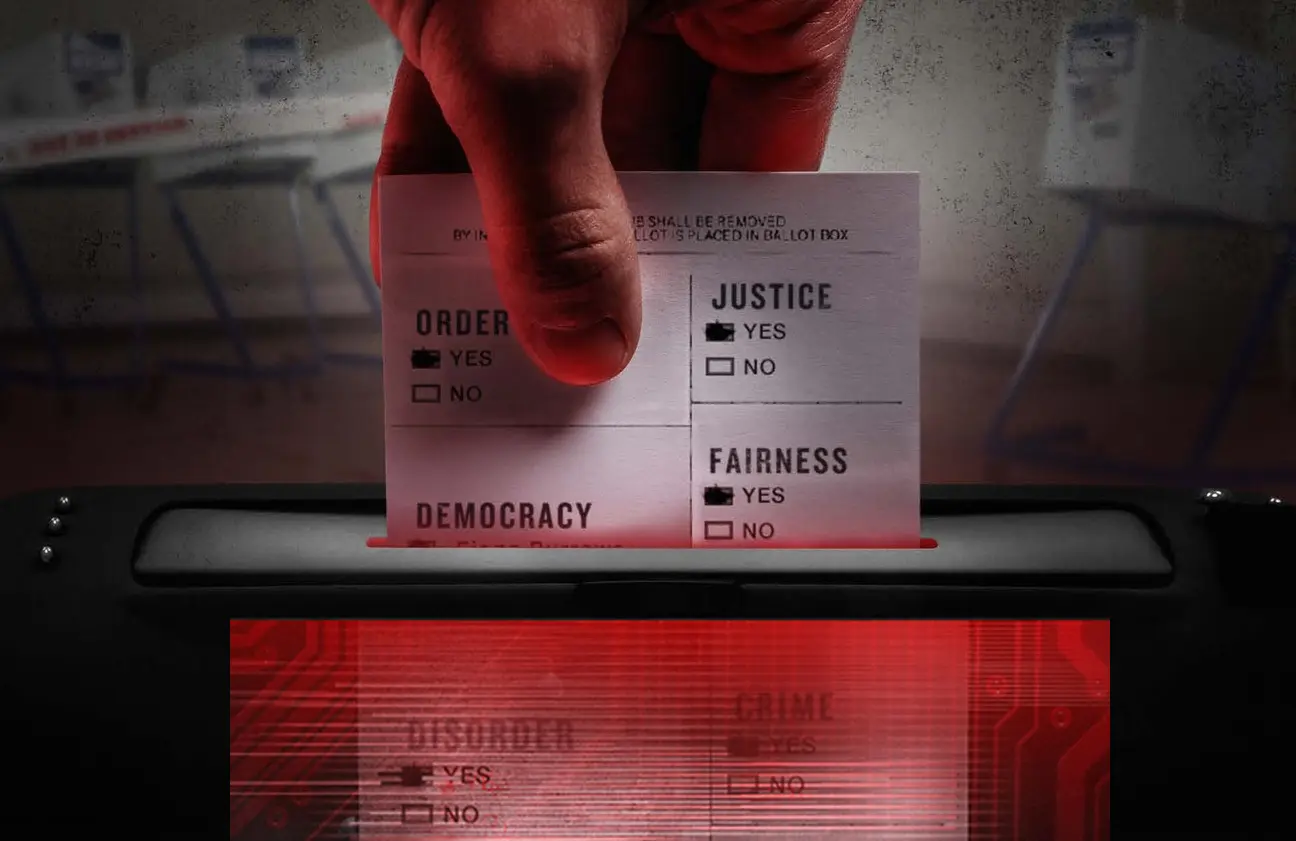Should You Vote For HBO's Election-Hacking Doc Kill Chain?
-
 Kill Chain: The Cyber War On America's Elections. (Image courtesy of HBO)
Kill Chain: The Cyber War On America's Elections. (Image courtesy of HBO)Primetimer editor-at-large Sarah D. Bunting knows a thing or two about true crime. She founded the true crime site The Blotter, and is the host of its weekly podcast, The Blotter Presents. Her new weekly column here on Primetimer is dedicated to all things true crime on TV.
Kill Chain has a couple of things working against it. The title of the documentary is one; the subtitle, The Cyber War On America's Elections, should differentiate it from last year's VOD "thriller" starring Nicolas Cage, but folks flipping through the channel guide may confuse the two. It doesn't help that the doc waits until close to the end of its runtime to define a cyber kill chain, a decision that makes the title seem cynically over the top. But Kill Chain's biggest problem, of course, is the timing of its release.
A year ago, a month ago... even two weeks ago, releasing a documentary on "the weaknesses of today's election technology" in the middle of the 2020 primary cycle would have seemed like the obvious play. But you don't need me to tell you that, thanks to COVID-19, the landscape has changed (not that this Brooklynite is supposed to go outside to look at it) — all of it, including the entertainment we seek out. Over the last couple of weeks, we've seen the culture leap into the washed-for-20-seconds arms of comfort-food TV properties like The Great British Bake Off or toothless vintage sitcoms, gentle and unchallenging relics of a time when hugging and tear-and-share loaves weren't lethal. And those of us who aren't practicing self-care with MasterChef Canada marathons may have gone to the other extreme, refreshing Twitter on one screen while cable-news anchors try to manage the flow of information on another. In other words, from a TV-consumption standpoint, we've become polarized in the way we variously choose to handle the crisis.
So it's ironic that Kill Chain is, at least in part, about the political polarization of the country, and the way bad actors from Russia and elsewhere deepened various divisions by exploiting insecurities in voting technology — but the doc may still slip between the cracks, even in an election year, even when the importance of choosing calm, competent leadership is put in its starkest relief. Should you make a point of watching?

It can wait. Kill Chain comes from the same filmmaker team that brought us HBO's Emmy-nominated Hacking Democracy, and it's put together competently enough. Like Hacking Democracy, Kill Chain spotlights computer programmer and analyst Harri Hursti; Hursti is an avuncular genius whose unflappable Scandinavian charisma makes the viewer feel like, despite serious problems with compromised machines and inconsistent government oversight, it's nothing a handful of white-hat hackers couldn't help solve. (The story about Hursti "drinking" a top-tier password "out of" a security chief is both grim and hilarious.) Other interviewees include various professors, progressive lawmakers, and hackers — including "Zeist," the guy who found and exploited a notorious "Alaskan back door" that could have left the 2016 elections in complete shambles — so the film's access is excellent. But Kill Chain can sometimes feel repetitive. We're shown security weaknesses and the ease of breaking into election systems over and over, in precincts all over the United States, and after one or two examples, the viewer gets the point. Kill Chain might have done better to spend more time on the process side, showing us more hacking, walking us through more breaches, hearing from more professors or law-enforcement professionals and spending more time at the DEF CON hacking conference... because the film also points out, repeatedly, that GOP lawmakers have no interest in supporting in election-security legislation. Senator Amy Klobuchar grumbling that she doesn't see why they don't want these bills to pass is a low point in the film, too. Really, Klobes? You don't "see" why they wouldn't pass laws reinforcing the integrity of the voting system, when the current arrangement invariably benefits them?
It's true that many of us don't want to contend with more, or different, bad news on top of what we're all facing at the moment. Viewers who might have set their DVRs for this documentary on February 26th may not feel like they have psychological space for it a month later. But it's not just that the film's bringing us evidence of past malfeasance, and dire predictions of it in the future. The real challenge for Kill Chain is the kind of bad news it imparts, because it's so similar to what we're dealing with in this pandemic: that the systems we rely on or take for granted don't do what we need them to, or assume they will, and that at the very top of the government is a vacuum of virtue and capability. One of the signature difficulties of this time in history is the sense of disorientation that the pandemic has created and the federal government has exacerbated, and we're looking for distractions from that, familiar firm ground — not even more evidence that everything we know is wrong. Kill Chain is a serviceable documentary, interesting enough, well-built enough... but unfortunately, "enough" isn't enough at the moment.
Kill Chain: The Cyber War on America's Elections premieres on HBO Thursday March 26th at 9:00 PM ET
Sarah D. Bunting co-founded Television Without Pity, and her work has appeared in Glamour and New York, and on MSNBC, NPR's Monkey See blog, MLB.com, and Yahoo!. Find her at her true-crime newsletter, Best Evidence, and on TV podcasts Extra Hot Great and Again With This.
TOPICS: Kill Chain: The Cyber War on America’s Elections, HBO, Amy Klobuchar, Hacking, True Crime